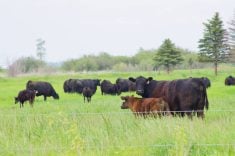LETHBRIDGE, Alta. – Darren Winsczura hoped for a last minute reprieve
as he mounted the courthouse steps on his way to jail.
Instead, he and 12 other Alberta farmers were handcuffed and shackled
for their journey to the Lethbridge Remand Centre.
“Right up until the end I thought there was a possibility they wouldn’t
put us in jail,” said the Viking, Alta., farmer.
After spending a night in jail, Winsczura and three others paid their
fines for Customs Act and wheat export violations committed in 1996.
Read Also

House ag committee to undertake several studies
The House of Commons standing agriculture committee has set its agenda for the coming months. Members began the fall sitting with a two-hour update on international trade
Winsczura was sentenced to 25 days, but was told later the term would
be reduced to 10 days behind bars. He had decided beforehand to serve
only a night in jail because he had to get back to his farm and his
off-farm job in the oil patch.
Going to jail was an unnerving experience, admitted the 35-year-old
Winsczura.
Following a rally organized by Farmers for Justice to garner support
for the 13 farmers who chose to go to jail rather than pay fines for
wheat export violations dating back to 1996, supporters lined the
streets and blocked traffic so the men, supported by their wives and
children, could cross the street to the courthouse.
Police started handcuffing the men in front of the courthouse, but only
Noel Hyslip and Jim Ness were handcuffed before Canadian Alliance MP
Art Hanger intervened and told police it was not necessary. Hanger’s
nephew Rod is part of the group who elected to go to jail.
Once in the court house, the men were led into a holding area where
they surrendered all personal possessions, including wallets and
watches. Grouped in pairs, they were handcuffed and shackled at the
legs before being loaded into a caged van for their trip to the remand
centre.
At the jail, they were photographed and received a quick medical
examination. They then stripped in private and were issued prison
uniforms.
“It’s a totally different situation in there,” Winsczura said.
There are no clocks and no sense of time, he added.
The group was kept together, but some inmates from the general
population have since been moved in with the farmers.
The most well-known of the group is wheat board director Jim Chatenay
of Penhold, Alta., who does not know what the future holds for him as a
board director.
His legal problems began in 1996 when he donated a bushel of grain to a
4-H club in Montana without a permit, as part of a protest against the
wheat board’s export monopoly. He refused to turn over his van when
stopped by Canada Customs officials and was subsequently fined $2,500.
Chatenay said he faces suspension from the board.
“I have always lived on the edge in the boardroom and this is good for
a huge reprimand. I’ve already been reprimanded six or seven times but
I just love my job.”
Colleen Bianchi of Milk River, Alta., an active member of Farmers for
Justice, believes this action could influence the current wheat board
election.
“The timing couldn’t be better with the elections. If there is no
change now, there may never be,” she said in an interview at the rally.
Immediately following the event, the Western Barley Growers Association
led a strategy meeting to discuss fundraising to pay fines and keep the
momentum going.
Money is being collected at the Royal Bank of Canada and donations may
be forwarded to a Free the Farmers Fund, Box 68, Cremona, Alta., TOM
ORO.
“If we have the money, we will go to the guys and say, ‘we are prepared
to do this for you,’ ” said Albert Wagner, an open market candidate in
District 5 and president of the barley growers association.
He agrees this incident could influence more people to vote against
incumbents.
“The support for the farmers is unbelievable,” Wagner said.
“They are appalled that these guys ended up in jail.”

















